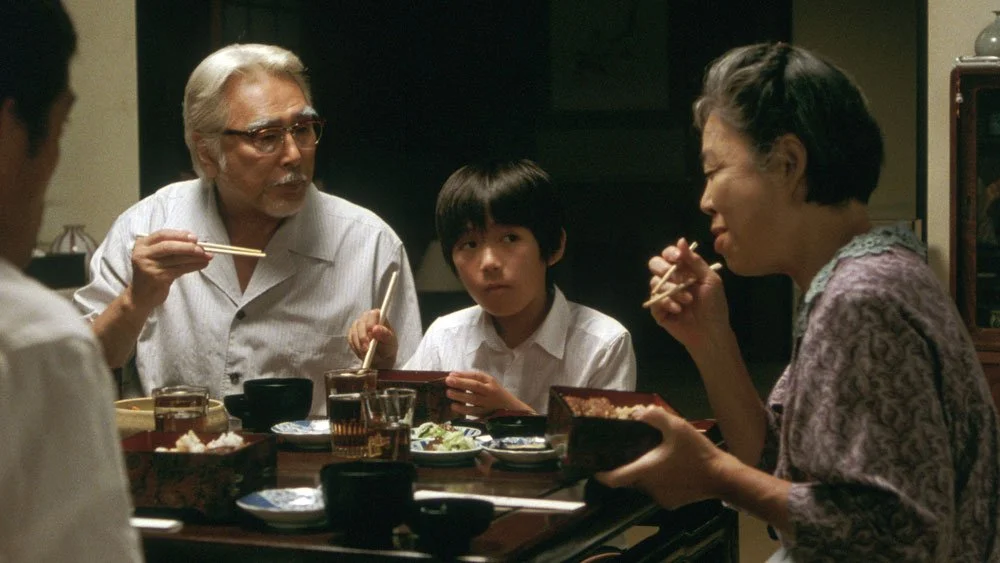Still Walking
Written by Mark Landau
Sometimes when I'm struck by a feeling of sadness or regret I think of and rewatch a favorite film of mine. It's something that can bring a sense of comfort and familiarity. But it's also a way to reflect on and recognize what these films mean to me personally.
Recently I felt compelled to once again watch Koreeda Hirokazu’s Still Walking (Aruitemo, Aruitemo).
On the surface the film is exceedingly simple: an extended family comes together for a memorial ceremony for a deceased member of the family on the anniversary of his death. There are no explosive arguments, flashback scenes, elaborate sets, or long philosophical monologues. Just a certain day in the life of a family that holds special significance to each of them.
There are the retired grandparents (Toshiko and Kyohei) playing host to their two living children, a son and daughter (Ryota and Yukari), their other son, whose death they are remembering on this day, as well as Ryota and Yukari’s partners and children. The relationships between parents and children are not particularly close or affectionate, but not hostile or totally estranged either.
They are the kind of extended family that has grown somewhat distant over the years. This is the result of having moved further away in physical distance as well as becoming emotionally distant from one another. With old wounds that remain without ever having fully healed they maintain a balance through meeting primarily on special occasions.
In my understanding of this film, and what makes it so special to me, is that it's about finding a way to live with the imperfections of your life and to enjoy what you have with who you love. That there are always things that will linger and leave you with regrets. The point is to continue on and live your life so that you don't have more regrets and to make the most of your time with everyone.
You're not always going to live up to your family's expectations, your own expectations or always please everyone. To be a father/mother, husband/wife, son/daughter or someone special to another person in a family it's what brings you together that's stronger than what divides you that makes life special.
The other aspect of the film that has always stuck with me is the naturalness of each room in the family home, each line of dialogue fits just right and each subtle gesture feels like we are observing a real family. I find this subtlety so great every time I rewatch the film I seem to notice new details that further remind me of how amazing a director Koreeda really is. For example, in a scene later in the film Ryota, his wife and son are having dinner with his parents after his sister, partner and children have left. When his mother Toshiko recounts purchasing a record of her favorite song her husband Kyohei momentarily freezes when lifting his chopsticks and turns towards his wife before resuming eating. In this scene he is positioned to the left side of the frame and this small action can easily go unnoticed. I myself only just noticed it when most recently rewatching the film after having seen it countless times before. In this scene with the placing of characters around the table, the delicate arrangement of dishes on the table, and family mementos visible on shelves in the background the mise en scene (or the totality of what is placed in front of us to see in the picture) surrounds us and places us squarely in their home in a convincing way. It is also not surprising given Koreeda began his career making documentary films which gave him an eye for details that could easily go unnoticed.
Though the movie deals with somber and heavy subject matter it never feels like an overly serious attempt to “teach the audience a lesson” or forces certain developments to create drama or tension like many other films centred on families. This goes hand in hand with the feeling of naturalness in the film. There is even humor and levity at times like in enjoying freshly smashed watermelon, or looking at old family albums. The home video release even contains a booklet with recipes of meals made in the film showing the kind of care that went into the smallest of details in showing this family’s character.
Towards the end of the film a further point is emphasized that has been hanging in the background the whole film: To not put off what we know is important. We never know when someone might suddenly leave our lives tragically so we should remember what makes our time with each other special and to consider how to make the most of this time. In one of the last scenes of the film Ryota after having boarded a bus with his wife and son leaving his parents behind, remembers the name of a Sumo wrestler his mother was trying to remember earlier in the film. Before he turns back around looking through the rear window he remarks “It's always like that, I'm always a little late”. Though itself a fairly trivial matter it's this feeling of looking back with a sense of regret that lingers as the movie approaches its conclusion. Moments later Ryota narrates further developments after the conclusion of the family gathering that further reinforce this sense of having left something incomplete and looking back in regret.
While what you may see, feel, or relate to most or connect to your own life after watching Still Walking will likely differ from what I do, this I believe is what makes the film a truly personal and touching reflection on love, family, and life.


